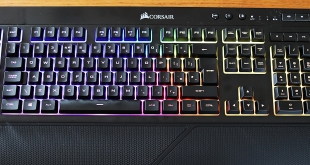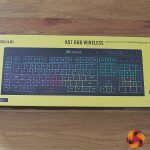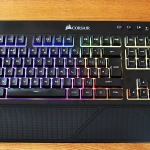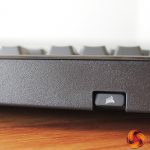
Are you running several systems or devices with multiple keyboards? Ever wanted an easy way to use a single keyboard between systems? Well Corsair may have done just that with the brand new K57 RGB Wireless keyboard featuring Slipstream wireless technology and two separate Bluetooth channels. It also features Capellix LED technology for lower energy consumption, longer life and better brightness. Could this be a multimedia/power user's best friend?
Specifications:
- Dimensions: 48 cm L x 16.6 cm W x 3.5 cm H
- Weight without cable/wrist wrest: 0.95 kg
- Detachable rubber palm rest
- Capellix RGB Technology (60% brighter/60% less power/60% more efficient and 35% longer lasting)
- Dedicated Multimedia keys
- 6 Programmable macro keys
- Up to 170 hours battery life with 3200mAh lithium-ion battery
- 1000Hz Polling rate (adjustable)
- Slipstream wireless with USB dongle (sub 1ms response rate with IFS)
- Low latency Bluetooth technology
- 11 stored RGB light modes controllable via Fn + Num keys
- iCue software
You can buy the Corsair K57 RGB Wireless for £89.99 from Overclockers UK HERE.
Pros:
- Excellent usability/functionality between multiple devices.
- Sleek, stylish design.
- Vivid RGB with a plethora of customisation options.
- iCUE software is a pleasure to use.
Cons:
- Not very portable.
- Keyboard flexes in the centre.
- Not mechanical switches.
KitGuru says: The K57 RGB Wireless is a feature-packed keyboard that I've really enjoyed using. If you're just looking for a standard, wired keyboard for use at one desk this won't be for you – but if you want a solid, practical board for use between multiple systems then this is definitely for you.
 KitGuru KitGuru.net – Tech News | Hardware News | Hardware Reviews | IOS | Mobile | Gaming | Graphics Cards
KitGuru KitGuru.net – Tech News | Hardware News | Hardware Reviews | IOS | Mobile | Gaming | Graphics Cards












